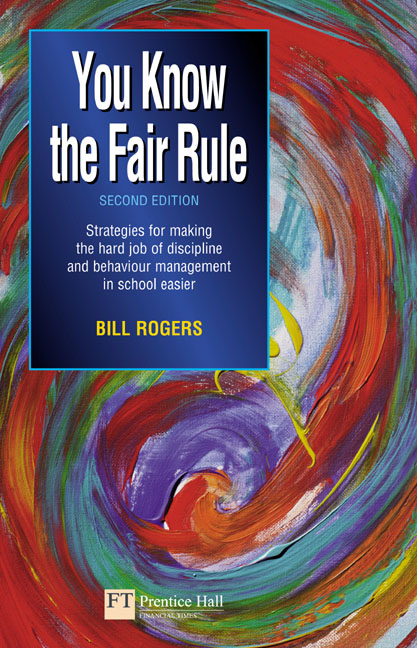My recent holiday reading has consisted of Bill Rogers' 'You Know the Fair Rule'. I got the book for Christmas last year and hadn't got round to reading it. So, when I was looking for reading material to take on holiday with me to Turkey this past week it was the one I chose to take with me.
If you're looking for a book on behaviour management and essential 'a bible' on the topic then this is the one to get! I have been engrossed in the book all week as I attempt to prepare myself for my NQT year and try to think of ways in which I can improve on my existing behaviour management skills.
I have been quite lucky this year on my GTP in respect to not actually having any real behavioural difficulties to deal with, although there were those low-level disruptions to deal with. However, from working previously as a cover supervisor I have experienced by share of 'nightmare' classes and have had some really bad days where I've thought about why on earth I'd want to continue teaching. Looking forward to starting my NQT year in September I felt that, with a fresh start and new classes to establish rules and relationships with, reading a book like Bill's would be great preparation in ensuring I get the start right; this was my main reason for reading the book.
The Chapter I was most concerned with was the one where Bill highlights the best ways in which you can establish your classroom rules to a class and how to stick to these throughout the year, what to do when things go wrong and the support that should be available to you. The key thing in the book is that Bill Rogers places the emphasis of the behaviour on the students and them taking responsibility for their own behaviour and ultimately are the ones that decide whether to abide by or break the rules you set.
The book also places a great deal of attention on the use of language you use as a teacher and how getting the right, positive language will make disciplining and behaviour management much more manageable and in effect will lead to better relationships with your students. Simple things like rather than saying 'don't run' saying 'walking, thanks'.
There is a really good chapter on the 'difficult class' too where some really good methods to use to combat the unwanted behaviour are given.
I have thoroughly enjoyed reading the book and have taken on board how important it is to get the routines, rules and rights in place at the start of the year and how getting classes to do simple things like entering and exiting the class in a specific fashion can have a massive impact on their behaviour. I almost wish I had read the book before my GTP year as I feel I would have placed a much greater emphasis on the start of the year and explaining my classroom rules to my students.
Equally though, I was also quite pleased with how many things the book stated that I have been doing throughout the last year, the examples given are extensive throughout the book with each scenario discussed and I was pleased to read that quite a few of the techniques and methods given for solving certain 'disputes' were ones that I have been using.
I will look to build on the things I consider I have been doing right this past year (in reference to the book) when starting my NQT year in September. I will also look to ensure I have a good start with each of my classes and perhaps spend a little more time than I did this year explaining my (high) expectations to my classes in regards to their work and behaviour. I will also continue to use the positive correctional language that Bill Rogers suggests in the book.

Tidak ada komentar:
Posting Komentar